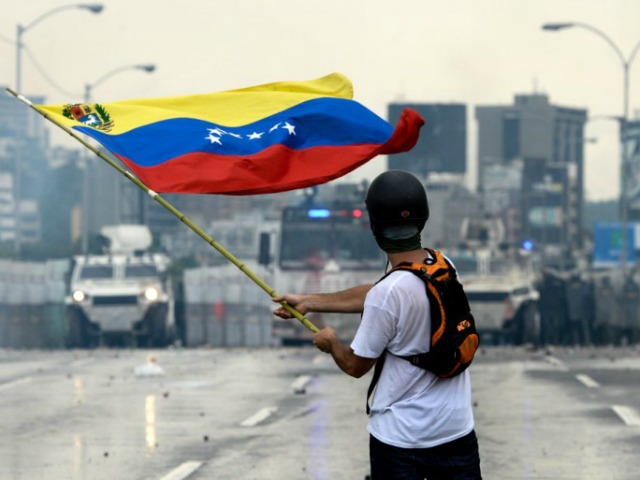The U.N.’s human rights office painted a grim picture of socialist Venezuela in a report issued Wednesday, documenting “extensive” and widespread repression of rights amid deteriorating living standards that have seen nearly half of all children affected by malnutrition.
The Office of the U.N. High Commissioner for Human Rights (OHCHR) formed a team in June to document human rights violations in the failed socialist nation, but says it was denied access to the country by President Nicolás Maduro’s government. Consequently, it conducted “remote monitoring activities in the region” including interviews with victims, families, NGOs, and the attorney general’s office.
“OHCHR’s findings detailed in this report point to an increasingly critical human rights situation since the protests began, with mounting levels of repression of political dissent by national security forces, and increasing stigmatization and persecution of people perceived as opposing the Government of President Maduro,” the report found.
The report says it also documented “extensive violations of human rights” during the demonstrations, with security forces detaining protesters, and treating them poorly:
Patterns of ill-treatment, in some cases amounting to torture, and serious violations of due process rights of persons detained in connection with the protests by Venezuelan authorities were also documented. Credible and consistent accounts of victims and witnesses indicate that security forces systematically used excessive force to deter demonstrations, crush dissent and instil fear. The Bolivarian National Police (PNB) and the Bolivarian National Guard (GNB), which is part of the armed forces, used tear gas and other less lethal weapons, such as water cannons and plastic pellets, during demonstrations without prior warning, in a non-progressive manner, and in violation of the international legal principles of necessity and proportionality.
In terms of numbers, the report found at least 124 deaths were being investigated in the context of demonstrations, while 5,051 people were detained “arbitrarily” between April and July—many of whom were subjected to “cruel, inhuman or degrading” punishment, sometimes amounting to torture.
“Treatment included the use of electric shocks, severe beatings, stress positions, suffocation, and threats of sexual violence and death, and intended to punish, humiliate and terrorize the detainees, as well as to extract confessions and information about alleged anti-government activities,” the report found. It also documented attacks on journalists and suppression of the free press.
“The policies pursued by the authorities in their response to the protests have been at the cost of Venezuelans’ rights and freedoms,” U.N. High Commissioner for Human Rights Zeid Ra’ad Al Hussein said in a statement accompanying the report. “The Government must ensure there are prompt, independent and effective investigations of the human rights violations allegedly committed by the security forces and of the abuses involving armed colectivos or violent protesters.”
The report paints a grim picture of the country as a whole.
“The deteriorating economic situation has caused hyperinflation and severe food, medicine, and electricity shortages, which, combined with a drastic reduction of the Government’s budget for social services, has led to a regression in the enjoyment of social and economic rights,” the report says.
Maduro has made an ambitious power grab for the country, holding elections in July to elect members of the “national constituents’ assembly,” an unconstitutional entity that Maduro has fabricated to replace the democratic National Assembly. This has taken place all while the country is being hit by soaring inflation and a growing famine.
The report cites a study saying that a family of five now needs to earn 14 minimum wage salaries to be able to purchase a basket of basic food and that almost half of children in the country have suffered “some form of malnutrition.”
In terms of crime, it finds Caracas is now the most violent city in the world, with three other Venezuelan cities in the top 10.
The report calls for greater access of the OHCHR to the country and also demands the U.N.’s Human Rights Council to “monitor the developments in the country and consider taking measures to prevent further deterioration of the human rights situation and consider encouraging the General Assembly to do the same.
That call for the Human Rights Council to step up could be complicated by the fact that Venezuela is a current member of the Council. U.S. Ambassador Nikki Haley has called the Council a “haven of dictators” due to its membership, and also noted its silence on Venezuela compared to its many resolutions against Israel. She has also called for Venezuela to step down from the Council due to its human rights violations.
The OHCHR has been increasingly vocal about the deteriorating situation in Venezuela, with the latest report being the most thorough and detailed about the rights abuses, a report that is likely to put significant pressure on the Council to act.
Adam Shaw is a Breitbart News politics reporter based in New York. Follow Adam on Twitter: @AdamShawNY

COMMENTS
Please let us know if you're having issues with commenting.